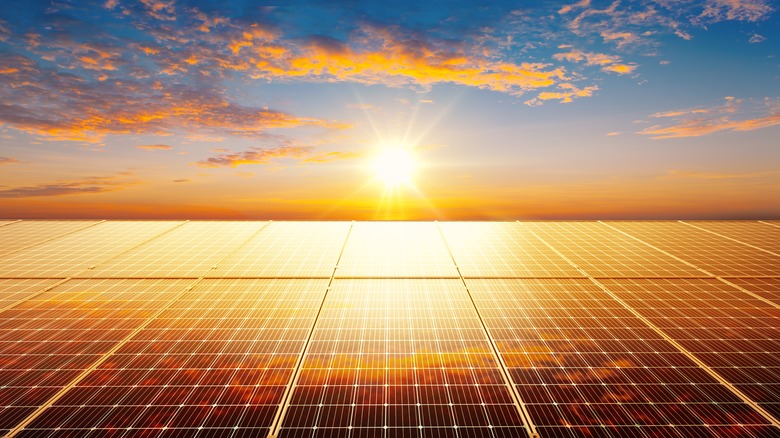What Our Solar Power Expert Wants You To Know About Solar Panels Before Installing A New Roof
A new roof is not always a simple fix. There are many mistakes people make when installing a roof, including sourcing materials from multiple suppliers and not installing overhangs correctly. But as we dive further into a technologically advanced decade, the biggest thing to consider is solar power. Solar panels on roofs have been shown to increase home value and homeowners are continuing to install them. In 2023, the use of residential solar panels increased by 13% compared to the previous year, with about 39% of 2022 homeowners saying they were considering them for their homes. But choosing solar panels isn't a simple choice.
Bret Biggart, CEO of Freedom Solar Power, a company that offers solar panel and backup power installation services for residential homes and commercial settings, spoke exclusively with House Blog about what homeowners and commercial building owners should know about solar panels before installing a new roof. From smaller details like tree coverage and whether or not you can install them on an old roof to bigger questions like if solar is really worth it, Biggart gives us some much-needed insight.
What to know about your roof before considering solar panels
"Before you commission a solar panel installation, you need to assess your property's solar potential," Bret Biggart, CEO of Freedom Solar Power, said in an exclusive interview with House Blog. "You can do this in a couple of ways. For example, you can consult with your local solar provider, or use an online tool, such as Freedom Solar Power's free solar potential calculator." Biggart explained that a provider will look for things like roof orientation and slope, shading from trees or structures, and the structural integrity of your roof.
The structural integrity is important. You wouldn't want to install solar panels on a roof that isn't in solid shape. "Whether your roof is brand new or not doesn't matter, but it needs to be in good condition in order for solar panels to be installed properly," Biggart said. "If you need major roof repairs in the near future, you should wait until those repairs are complete before considering solar." You also want to consider the actual style of your roof. "Your roof type can also make solar impractical," he explained. "The most common roof type, composite shingle, makes for a straightforward installation, as well as standing seam metal. Ground-mounted solar may be an option if your roof is incompatible with solar panels."
Other things to consider before installing solar panels
It's not just the age or state of your roof that needs to be assessed, but also the location of your home. "You need a certain amount of unobstructed sunlight to make the installation cost worthwhile," Bret Biggart, CEO of Freedom Solar Power, exclusively told House Blog. "The amount of solar power that can reach your home depends on where you live, how much shade covers your roof (trees or roof structures such as chimneys create roof shade), and the direction your roof is facing (south-facing is best)."
Even if your roof isn't in the perfect location in terms of sunlight, solar panels can still be a good choice. "Once solar experts assess your property, they create a solar system design to maximize energy production," Biggart said. "This design doesn't mean creating entirely new panel technology for your specific home!" he clarified. "The system design includes aspects like the solar panel size you need and how many solar panels you need."
Are solar panels worth it?
If your roof is a fit for the installation of solar panels, all that is left to determine is whether or not they are worth it. "Rooftop solar panels can increase your home's resale price with a return on investment (ROI) that is higher than many other types of home improvements," Bret Biggart, CEO of Freedom Solar Power, told House Blog exclusively. "According to Zillow, solar panels boost the selling price of a home by 4.1%. A recent study by the University of Michigan went further to say that southern states will see a [nearly] 20% return on investment on solar over the next 25 years."
And it's not just the home value that makes solar panels a smart decision — solar panels are also low maintenance. "Solar power systems require minimal maintenance costs," according to Biggart. "Any damage from storms or other natural events will be covered by your homeowner's insurance, and any necessary repairs or replacements should be covered by your system's warranty."



